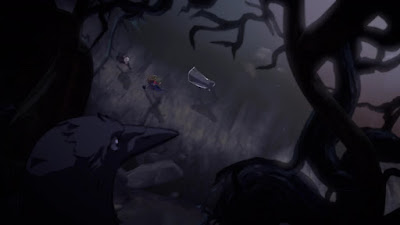Read the next entry here.
Matters are made to look all the poorer in the penultimate episode of the season.
1.8, "Cursed Caldera"
Written by Aaron Ehasz and Justin RichmondDirected by Villads Spangsberg
Synopsis
 |
| Not the homiest view, no. Image taken from the episode, used for commentary. |
Rayla, Ezran, and Callum race up the side of the mountain, fleeing pursuit and seeking the healer whose skills have been reported to them. It is a treacherous path, to be sure, though they soon find guides in Ellis and Ava and proceed up the mountain after awkward introductions.
At the castle of Katolis, Viren returns to interrogating the captive Runaan. The Elf is loathe to talk, and Viren promises horrors to come.
As night falls, Ezran, Ellis, Rayla, Callum, and Ava begin to be beset by monsters and apparitions. A fracas ensues, with the group taking refuge on high after becoming separated. They confer in their smaller groups, various members admitting weaknesses to one another and finding some adjustments to their ideas in the wake of the discussions.
 |
| Pragmatic, yes. Image taken from the episode, used for commentary. |
Ezran, Ellis, Rayla, Callum, and Ava reconvene after a time, thinking themselves safe. They are wrong and are attacked again; a fracas ensues, but the group handles it better on the second occasion, defeating the monster attacking them, as well as the young that creep from its corpse. After, they find that there is, in fact, no healer to be found.

No comments:
Post a Comment